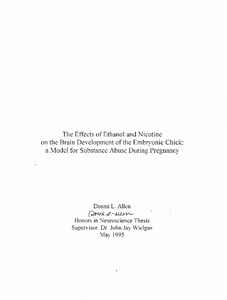The Effects of Ethanol and Nicotine on the Brain Development of the Embryonic Chick: A Model for Substance Abuse During Pregnancy

View/
Author
Allen, Donna Laurie
Subject
Washington and Lee University -- Honors in Neuroscience
Substance abuse in pregnancy
Pregnant women -- Tobacco use
Pregnant women -- Alcohol use
Metadata
Show full item recordDescription
The chick embryo was used as an animal model to test the effects of ethanol and nicotine on the brain of the developing embryo. The experimental groups received 2 μl doses of either Howard Ringers solution, 0.5% ethanol, 5.0% nicotine, or a combined treatment of ethanol and nicotine at their respective doses. All treatments were given on days 1-7 of incubation, which is analogous to the first trimester of human gestation. Data was collected for the control, nicotine treated, and ethanol + nicotine treated groups. A moderately significant difference was found between the brain-to-body weight ratios of the control and ethanol+ nicotine treated groups (p< 0.05). Significant differences were found between the control and nicotine treated groups for mean neuron counts of two cortical layers and the pyramidal thalamic cells (p< 0.01). Significant differences were also found between the control and ethanol + nicotine treated groups for all four neuronal counts taken (p< 0.01). The nicotine treated and ethanol+ nicotine treated groups differed significantly for the mean neuron counts for both types of thalamic cells. These results suggest that nicotine treatments inhibit neuroblast division, which results in reduced cell density and brain-to-body weight ratios. The effects were more pronounced for the ethanol + nicotine treated group, suggesting the damage is compounded by the addition of ethanol.